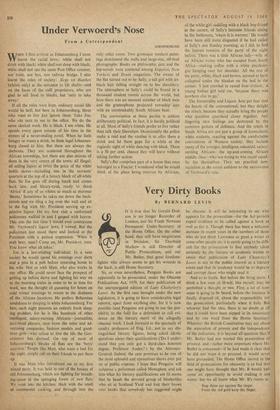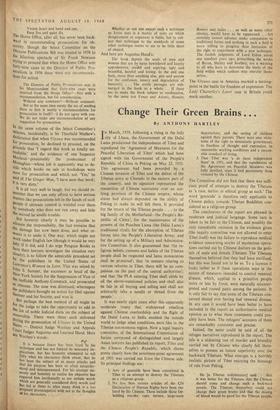Very Dirty Books
By BERNARD LEVIN So, or even nevertheless, Penguin Books are apparently to be prosecuted, under the Obscene Publications Act, 1959, for their publication of the unexpurgated edition of Lady Chatterley's Lover. As the first case brought under the new legislation, it is going to have considerable legal interest, apart from anything else, for it is now possible (and Penguins are going to use the pos- sibility to the full) for a defendant to call evi- dence on the literary merit of the allegedly obscene work. I look forward to the spectacle of sundry professors of Eng. Lit., not to say dis- tinguished literary figures, being asked idiotic questions about their qualifications ('Do I under- stand that you only got a third-class honours degree, Professor Auden?') by the Attorney- General. Indeed, the case promises to be one of the most splendid and uproarious shows ever put on at public expense. I hope that Penguins will subpawa a policeman called Monaghan, and ask him what his literary qualifications are (it seems that he heads the devoted group of bluebottles who sit at Scotland Yard and knit their brows over books that somebody has suggested might be obscene. It will be interesting to see who appears for the prosecution—for the Act permits expert evidence to be called against a book as well as for it. Though there has been a welcome increase in recent )'ears in the numbers of those who do not think Lawrence as great a writer as some other people do, it is surely going to be ditl cult for the prosecution to find anybody like seriously by the literary or academic worlds to swear that publication of Lady Chatterley s Lover is not in the public interest as a literary event and that its tendency would be to depraNe and corrupt those w ho might read it.
And so to battle. But before the firing starts. I think a few men of like myself, may he permitted a thought or two. First, a lot of non- sense sense is going to be heard, before the business is finally disposed of, about the responsibility for the prosecution, particularly when it fails. But whoever had the idea, there is no doubt at all that it could have been nipped in its unsavoury bud by one word from the Home Secretary. Whatever the British Constitution may say about the separation of powers and the independence of the judicature, it is beyond all question that if Mr. Butler had not wanted this prosecution 10 proceed. and—rather More important where Mr. Butler is concerned—if he had made it clear that he did not want it to proceed, it would never have ,proceeded. The Home Office record in the field of prosecutions for obscenity is so bad th it one might have thought that Mr. B would wel- come an opportunity to avoid making it any worse: but we all know what Mr. B's motto i!
Stop thine ear against the singer From the red gold keep thy finger;
Vacant heart and hand and eye, Easy live and quiet die. The Home Office, after all, has never been back-
ward in recommending prosecutions for ob- scenity, though the Select Committee on the Obscene Publications Bill was treated in 1958 to the hilarious spectacle of Sir Frank Newsam trying to pretend that when the Home Office sent forty-nine cases to the Director of Public Pro- secutions in 1956 these were not recommenda- tions for action.
The Director of Public. Prosecutions says in his Memorandum that forty-nine cases were received from the Home Office?—Not with a recommendation, but for consideration.
Without any comment?—Without comment.
But at the same time surely the act of sending them to him is tacitly a recommendation for Prosecution in itself?-1 do not agree with you. We do not make any recommendation of any suggestion for prosecution.
It the same volume of the Select Committee's minutes, incidentally, is Sir Theobald Mathew's declaration that when Ulysses was recommended for prosecution, he declined to proceed, on the grounds that 'I regard this book as totally un- readable,' and the evidence of one Inspector Maeleod—presumably the predecessor of Monaghan—whose job it apparently was to de- cide which books on sale in bookshops were Meet for prosecution and which not. 'Yes,' he said of The Ginger Man, 'I have seen that book; it is very dirty.'
It is all very well to laugh; but we should re- member that we can only afford to have serious Matters like prosecutions left in the hands of such People if ultimate control is wielded over them by somebody who does not run away and hide the second he smells trouble.
Rot however clearly it may be possible to allocate the responsibility, the fact remains that the damage has now been done, and what re- mains is to undo it. One way, which might not Work under English law (though it would be very I°11Y if it did, and I do urge Penguin Books to have their lawyers investigate the situation very
Closely), is to follow the admirable precedent set oY the publishers in the United States of
_Lawrence's Women in Love. This was seized by
John S. Sumner, the successor as head of the New York Society for the Suppression of Vice of
the ineffable Anthony Comstock, and prosecuted as obscene. The case was dismissed, whereupon tc!te Publishers brought an action for libel against °tollner and his Society, and won it. 13ur Perhaps the best method of all might be 'cr the judge to take the opportunity to add to the list of noble judicial dicta on the subject of censorship. There were three such delivered
during
the prosecution of Ulysses in the United
tes District Judge Woolsey and Appeals
Court Judges Augustus and Learned Hand. Here Ikre Woolsey's words: It is because Joyce has been loy:Co his technique and has not funked its necessary im- Plications, but has honestly attempted to tell fully what his characters think about, that he has been the subject of so many attacks and that his purpose has been so often misunder- stood and misrepresented. For his attempt sin- cerely and honestly to realise his objective has required him incidentally to use certain words Which are generally considered dirty words and has led at times to what many think is a too Poignant preoccupation with sex in the thoughts Of his characters. . . .
Whether or not one enjoys such a technique as Joyce uses is a matter of taste on which disagreement or argument is futile, but to sub- ject that technique to the standards of some other technique seems to me to be little short of absurd.
And here are Augustus Hand's:
The book depicts the souls of men and women that are by turns bewildered and keenly apprehensive, sordid and aspiring, ugly and beautiful, hateful and loving. In the end one feels, more than anything else, pity and sorrow for the confusion, misery and degradation of humanity. . . . The erotic passages are sub- merged in the book as a whole. . . If these are to make the book subject to confiscation, by the same test Venus and Adonis. Hamlet, Romeo and Juliet . . . as well as many other classics, would have to be suppressed. . . Art certainly cannot advance under compulsion to traditional forms and nothing in such a field is more stifling to progiess than limitation of the right to experiment with a new technique. The foolish judgments of Lord Eldon about one hundred years ago, proscribing the works of Byron, Shelley and Southey, are a warning to all who have to determine the limits of the field within which authors may exercise them- selves.
The Ulysses case in America marked a turning- point in the battle for freedom of expression. The Lady Chatterley's Lover case in Britain could mark another.



































 Previous page
Previous page